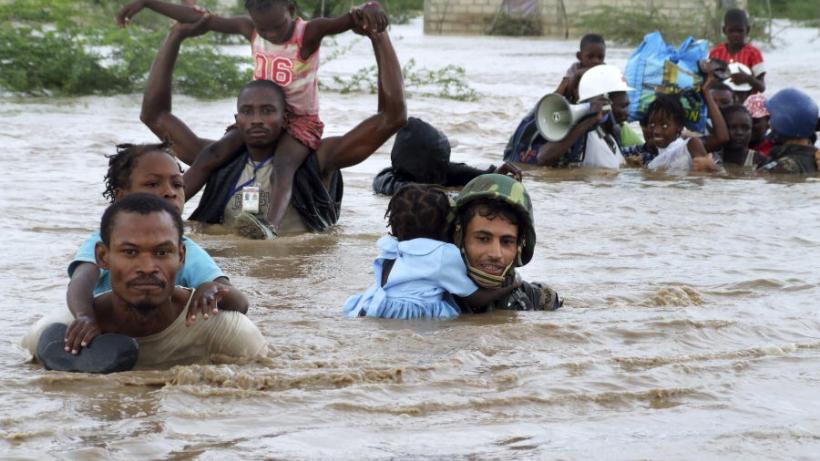
The Fragility Commission’s final evidence session: The power of resilience
Countries facing fragility and conflict lack resilience to shocks, which feed off each other in a negative cycle. Identifying policies to build resilience, and recover and learn from shocks, can prevent future crises stemming from instability.
In its fifth and final evidence session, held at the London School of Economics (LSE) on 28 September, the LSE-Oxford Commission on State Fragility, Growth and Development and its chair David Cameron, called on five experts working in humanitarian aid, health, climate change, and economic development to present evidence from their experiences building resilience. The following are key lessons from the session.
Humanitarian versus development programmes
The tension between humanitarian aid programmes, designed to respond to immediate natural or man-made disasters, and development programmes, designed to be sustainable and have longer term impact, can be a significant obstacle to implementing effective resilience programmes. From Debbie Hillier’s experience as Senior Humanitarian Policy Adviser at Oxfam, the humanitarian community is just not set up to prevent crises, while the development community can be blind to the shocks and hazards that the poorest face.
The same is true in global health crises, where non-governmental organisations (NGOs) are focused on dealing with the immediate consequences of a crisis such as Ebola, but not on building up health systems such as medical labs and cadres of health workers that would be vital in the next crisis, said Peter Sands, Research Fellow at Harvard University.
Connecting humanitarian aid and development programmes, however, is easier said than done. Clare Shakya, Director of the Climate Change Group at the International Institute for Environment and Development (IIED), pointed out that current financing structures for development organisations rarely allow for contingency funding to respond to crises. Therefore, a separate funding source that can be earmarked for contingencies would be useful.
One innovative example that Ms Hillier gave is a Hunger Safety Net Programme (HSNP) in northern Kenya, led and financed by the government with support from the United Kingdom (UK) Department for International Development (DFID), which scales up social protection payments to vulnerable households during times of crisis, such as a drought.

A beneficiary of the Hunger Safety Net Programme buying milk. Credit: www.hsnp.org.ke
Panic and neglect
Governments and the international community’s lack of focus on preventing crises in the first place only exacerbates the negative impacts once a crisis does take place, generating a so-called cycle of ‘panic and neglect’. This is especially true in fragile places, which already suffer from weak state capacity. If a country does not have a functioning health system, which is the first line of defence during disease outbreaks, a crisis such as Ebola could easily derail any economic and social progress that is taking place. In the case of Ebola, by the time the World Health Organisation (WHO) got involved, it was already too late to contain it, said Mr Sands.
This can also be the case for economic crises. Albert G. Zeufack, Chief Economist for Africa at the World Bank, highlighted research showing the global commodity price collapse, starting around 2015, increased the risk of conflict in Africa. Sound fiscal policies and buffers are therefore critical for natural resource-dependent countries to deal with shocks.
Ms Hillier suggested a change in incentives, where humanitarians are rewarded for preventing rather than responding to crises. More flexibility in using funds directed to humanitarian response for prevention programmes could also help, but this will require political impetus that is currently lacking, she said. Mr Sands added that communicating the financial risks of health crises could put more pressure on international actors. For example, he noted the International Monetary Fund (IMF) does not currently consider health risks in their Article IV consultations, which assesses economic and financial development in a country seeking to join the IMF.
The challenge of weak institutions
A theme cutting across all of the Fragility Commission’s evidence sessions is dealing with limited state capacity, which stalls development in fragile places in a multitude of ways. Herbert M’cleod, International Growth Centre (IGC) Country Director for Liberia and Sierra Leone, said the weak health systems that allowed Ebola to spread unchecked in Sierra Leone, can be traced back to a political governance system that encourages impunity, corruption, and patronage. Improving government institutions, therefore, needs to be at the heart of any resilience programme.
Mr M’cleod added that donor response to crises can even exacerbate fragility – governments that have limited capacity and are facing a crisis are often not in a position to argue against aid policies or programmes that are backed by millions of dollars. In these cases, the priorities of an influential donor run the danger of overshadowing a country’s needs and priorities.
To get around low capacity in the national government, Oxfam works with local authorities to improve day-to-day protection of communities in unstable and conflict situations. While this does not necessarily change or reduce the conflict, it can reduce the burden for people affected by it, Ms Hillier said. IIED has also found that channelling climate adaption funds to local governments leads to investments in interventions that are most responsive to community needs, Ms Shakya added.
Next steps for the Commission
Building resilience is one of five key dimensions of fragility that the Commission examined as part of its work to form policy recommendations for national and international actors to better support economic growth in countries facing fragility and conflict. The Commission is working on a final report outlining its policy recommendations to be released in Spring 2018. It will continue to engage widely with governments and the international community in implementing these recommendations.

